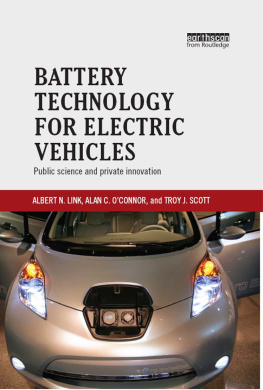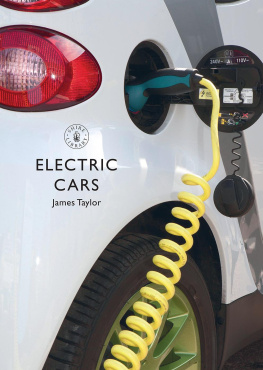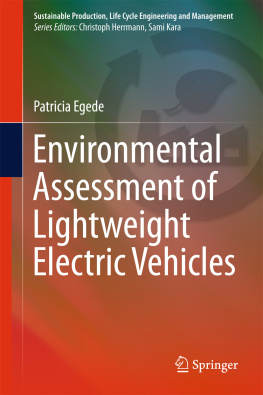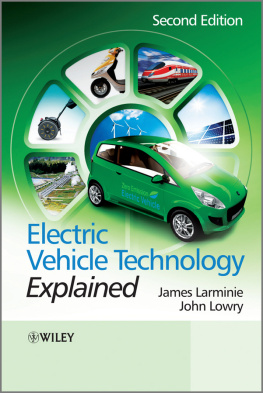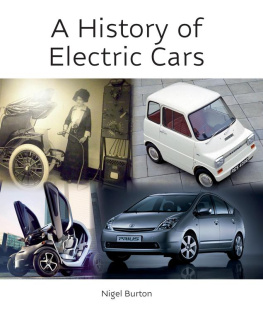Link Albert N. - Battery Technology for Electric Vehicles
Here you can read online Link Albert N. - Battery Technology for Electric Vehicles full text of the book (entire story) in english for free. Download pdf and epub, get meaning, cover and reviews about this ebook. publisher: Taylor and Francis, genre: Romance novel. Description of the work, (preface) as well as reviews are available. Best literature library LitArk.com created for fans of good reading and offers a wide selection of genres:
Romance novel
Science fiction
Adventure
Detective
Science
History
Home and family
Prose
Art
Politics
Computer
Non-fiction
Religion
Business
Children
Humor
Choose a favorite category and find really read worthwhile books. Enjoy immersion in the world of imagination, feel the emotions of the characters or learn something new for yourself, make an fascinating discovery.
- Book:Battery Technology for Electric Vehicles
- Author:
- Publisher:Taylor and Francis
- Genre:
- Rating:5 / 5
- Favourites:Add to favourites
- Your mark:
- 100
- 1
- 2
- 3
- 4
- 5
Battery Technology for Electric Vehicles: summary, description and annotation
We offer to read an annotation, description, summary or preface (depends on what the author of the book "Battery Technology for Electric Vehicles" wrote himself). If you haven't found the necessary information about the book — write in the comments, we will try to find it.
Battery Technology for Electric Vehicles — read online for free the complete book (whole text) full work
Below is the text of the book, divided by pages. System saving the place of the last page read, allows you to conveniently read the book "Battery Technology for Electric Vehicles" online for free, without having to search again every time where you left off. Put a bookmark, and you can go to the page where you finished reading at any time.
Font size:
Interval:
Bookmark:

Battery Technology for Electric Vehicles
Electric drive vehicles (EDVs) are seen on American roads in increasing numbers. Related to this market trend and critical for it to increase are improvements in battery technology. Battery Technology for Electric Vehicles examines in detail the research support from the U.S. Department of Energy (DOE) for the development of nickel metal hydride (NiMH) and lithium-ion (Li-ion) batteries used in EDVs. With public support comes accountability of the social outcomes associated with public investments.
The book overviews DOE investments in advanced battery technology, documents the adoption of these batteries in EDVs on the road, and calculates the economic benefits associated with these improved technologies. It provides a detailed global evaluation of the net social benefits associated with DOE investments, the results of the benefit-to-cost ratio of over 3.6-to-1, and the life-cycle approach that allows adopted EDVs to remain on the road over their expected future life, thus generating economic and environmental health benefits into the future.
Albert N. Link is Professor of Economics at the University of North Carolina at Greensboro, USA. His research is related to the economics of innovation, technology policy, and program evaluation.
Alan C. OConnor is an economist and Director of Innovation Economics at RTI International. He specializes in economic analysis of research and development (R&D) programs, program evaluation, and economic development.
Troy J. Scott is an economist at RTI International, where his research deals with the economics of technology and innovation. His work focuses on the nexus of public support for research and development (R&D), regulation, and R&D rivalry among firms to evaluate and inform public policy.
Fifty years ago Edwin Mansfield used economics and econometrics with in-depth case studies to transform our understanding of innovation. Since 1972, federal agencies have invested over a billion dollars in the battery technologies important to electric vehicles. Link, OConnor, and Scott use the Mansfield strategy to take readers under the hood and ask if these programs were in the public interest. Their book is a great read!
V. Kerry Smith, Arizona State
University, USA
The authors address an important issue which is high on the policy agenda in many industrialized countries. Even using conservative estimates about social benefits of public support for new technologies, they find substantial ones. In the vein of discussing public/private partnerships in science and technology, this study is a must-read for policy makers and research funders in the field.
Wolfgang Polt, Institute for Economic and
Innovation Research, Austria
This tome presents a thorough empirical economic evaluation of the social benefits attributable to federal R&D investment in vehicle battery technology in the United States. Link, OConnor, and Scott have produced one of the best such appraisals available. A must-read.
Nicholas S. Vonortas, George Washington
University, USA
Battery Technology for Electric Vehicles
Public science and private innovation
Albert N. Link, Alan C. OConnor, and Troy J. Scott

First published 2015
by Routledge
2 Park Square, Milton Park, Abingdon, Oxon OX14 4RN
and by Routledge
711 Third Avenue, New York, NY 10017
Routledge is an imprint of the Taylor & Francis Group, an informa business
2015 Albert N. Link, Alan C. OConnor, and Troy J. Scott
The right of Albert N. Link, Alan C. OConnor, and Troy J. Scott to be identified as authors of this work has been asserted by them in accordance with sections 77 and 78 of the Copyright, Designs and Patents Act 1988.
All rights reserved. No part of this book may be reprinted or reproduced or utilised in any form or by any electronic, mechanical, or other means, now known or hereafter invented, including photocopying and recording, or in any information storage or retrieval system, without permission in writing from the publishers.
Trademark notice: Product or corporate names may be trademarks or registered trademarks, and are used only for identification and explanation without intent to infringe.
British Library Cataloguing-in-Publication Data
A catalogue record for this book is available from the British Library
Library of Congress Cataloging-in-Publication Data
Link, Albert N.
Battery technology for electric vehicles : public science and private innovation / Albert N. Link, Alan C. OConnor, and Troy J. Scott.
pages cm
Includes bibliographical references and index.
1. Electric vehicles Batteries. 2. Electric vehicles Cost effectiveness. I. OConnor, Alan C. II. Scott, Troy J. III. Title.
TL220.L56 2015
629.25 dc23
2014039612
ISBN: 978-1-138-81110-2 (hbk)
ISBN: 978-1-315-74930-3 (ebk)
Typeset in Goudy
by Swales & Willis Ltd, Exeter, Devon, UK
For Carol, Scott, and Dorothy
Contents
A number of individuals contributed to this study, both in terms of their participation during the data collection effort and in terms of their comments and suggestions on earlier versions of these chapters.
We are grateful to the scientists, engineers, and analysts that contributed data and insight that informed the evaluation portion of this study, including those from A123 Systems (Navitas Systems), Amprius, Applied Materials, BASF Materials USA, BASF Catalysts, Dow Kokam, EnerDel, FMC Corporation, Ford Motor Company, General Motors, H&T Waterbury, K2 Energy Solutions, LG Chem Power, Maxwell Technologies, Miltec UV International, Nanosys, Saft America, Seeo, Ultimate Membrane Technologies, Northwestern University, Pennsylvania State University, SUNY Binghamton, University of Massachusetts Boston, University of Pittsburgh, University of Rhode Island, Argonne National Laboratory, Brookhaven National Laboratory, Idaho National Laboratory, Lawrence Berkeley National Laboratory (LBNL), National Renewable Energy Laboratory, Oak Ridge National Laboratory, Pacific Northwest National Laboratory, Southwest Research Institute, and U.S. Army Research Laboratory.
We are also grateful to a number of individuals who offered valuable comments and suggestions (alphabetically): Tien Duong (Vehicle Technologies Office [VTO] in the Office of Energy Efficiency and Renewable Energy [EERE] within the Department of Energy [DOE]), Irwin Feller (consultant to the American Association for the Advancement of Science), David Finifter (The College of William & Mary), Michael Gallaher (RTI International), Ken Keating (consultant to EERE), David Howell (VTO), William Key (VTO), Cheryl Oros (Oros Consulting), Rosalie Ruegg (TIA Consulting), Edward Vine (LBNL), and Thomas White (DOE Office of Policy).
A special thanks to Yaw Agyeman (LBNL) and Jeff Dowd (EERE) who supported financial assistance to conduct this study. And, a special thanks to the Center on Globalization, Governance and Competitiveness at Duke University for the use of .
Lastly, we are indebted to Sara Casey, Ross Loomis, and Lynn Davis, all of RTI International, for their invaluable contributions to this project.
ACE | advanced combustion engine |
AEC | Atomic Energy Commission |
ARRA | American Recovery and Reinvestment Act |
Font size:
Interval:
Bookmark:
Similar books «Battery Technology for Electric Vehicles»
Look at similar books to Battery Technology for Electric Vehicles. We have selected literature similar in name and meaning in the hope of providing readers with more options to find new, interesting, not yet read works.
Discussion, reviews of the book Battery Technology for Electric Vehicles and just readers' own opinions. Leave your comments, write what you think about the work, its meaning or the main characters. Specify what exactly you liked and what you didn't like, and why you think so.

